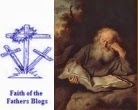Bishop, Greek Father of the Church, and Doctor of the Church
Saint Basil the Great (also known as Father of Eastern Monasticism; Basil of Caesarea) is one of the Three Cappadocian Fathers, a Greek Father of the Church and Doctor of the Church who was born in 329 at Caesarea, Asia Minor (modern Turkey).
He was of noble birth and his mother, father, and four of his nine siblings were canonized, including Saint Gregory of Nyssa. He was the grandson of Saint Macrina the Elder.
As a youth he was noted for organizing famine relief, and for working in the kitchens himself, which was quite unusual for a young noble.
He studied at Caesarea, Constantinople, and Athens, where he became acquainted with Saint Gregory of Nazianzus. Basil ran a school of oratory and law in Caesarea, and he was so successful, so sought after as a speaker, he was tempted by pride. Fearful that it would overtake his piety, he sold all that he had, gave away the money, and he became a priest and monk.
Influenced by his sister Macrina, he founded a monastery in Pontus near Annesi. He introduced the cenobitic form of religious life into the East, and for this reason is known as the Father of Oriental monasticism. In 364 he was ordained priest, and in 370 he succeeded to the See of Caesarea.
He is considered as key to the founding of Eastern Monasticism as Benedict of Nursia was to the west. His episcopacy was distinguished by the many reforms he effected among clergy and laity, and for his fearlessness in defending the Church. He conducted Mass and preached to the crowds twice each day and he fought Arianism.
Saint Basil the Great died in Caesarea in 379 of natural causes.
The following was written by Saint Jerome, in his book, Lives of Illustrious Men :
Basil another bishop
Basil, bishop of Caesarea in Cappadocia, the city formerly called Mazaca, composed admirable carefully written books Against Eunomius, a volume On the Holy Spirit, and nine homilies On the six days of creation, also a work On asceticism and short treatises on various subjects. He died in the reign of Gratianus.
Finally, below are some quotations from Saint Basil the Great:
The bread which you use is the bread of the hungry; the garment hanging in your wardrobe is the garment of him who is naked; the shoes you do not wear are the shoes of the one who is barefoot; the acts of charity that you do not perform are so many injustices that you commit. -- Saint Basil the Great
O sinner, be not discouraged, but have recourse to Mary in all you necessities. Call her to your assistance, for such is the divine Will that she should help in every kind of necessity. --Saint Basil the Great
By the command of your only-begotten Son we communicate with the memory of your saints...by whose prayers and supplications have mercy upon us all, and deliver us for the sake of your holy name. --Saint Basil the Great
Through the Holy Spirit we are restored to paradise, led back to the Kingdom of heaven, and adopted as children, given confidence to call God "Father" and to share in Christ's grace, called children of light and given a share in eternal glory. --Saint Basil the Great
Beside each believer stands an angel as protector and shepherd leading him to life. --Saint Basil the Great
The following was written by Saint Jerome, in his book, Lives of Illustrious Men :
Basil another bishop
Basil, bishop of Caesarea in Cappadocia, the city formerly called Mazaca, composed admirable carefully written books Against Eunomius, a volume On the Holy Spirit, and nine homilies On the six days of creation, also a work On asceticism and short treatises on various subjects. He died in the reign of Gratianus.
Finally, below are some quotations from Saint Basil the Great:
The bread which you use is the bread of the hungry; the garment hanging in your wardrobe is the garment of him who is naked; the shoes you do not wear are the shoes of the one who is barefoot; the acts of charity that you do not perform are so many injustices that you commit. -- Saint Basil the Great
O sinner, be not discouraged, but have recourse to Mary in all you necessities. Call her to your assistance, for such is the divine Will that she should help in every kind of necessity. --Saint Basil the Great
By the command of your only-begotten Son we communicate with the memory of your saints...by whose prayers and supplications have mercy upon us all, and deliver us for the sake of your holy name. --Saint Basil the Great
Through the Holy Spirit we are restored to paradise, led back to the Kingdom of heaven, and adopted as children, given confidence to call God "Father" and to share in Christ's grace, called children of light and given a share in eternal glory. --Saint Basil the Great
Beside each believer stands an angel as protector and shepherd leading him to life. --Saint Basil the Great



